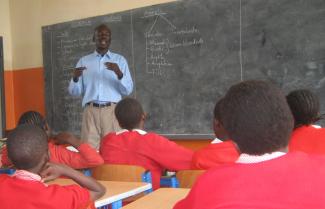Human Development Report 2014
Progress for everybody

The annual report series is published by the UN Development Programme (UNDP). It considers human development to be about more than income per head. Other relevant aspects include health and education, for instance. The current HDR acknowledges steady progress in human development, but notes that such progress is slowing and not shared equally. Income disparities have been rising internationally, while inequality in education has remained broadly constant.
The current HDR warns that achievements in human development can quickly be undermined by natural disasters, economic crises and violent conflicts. Hence it matters how secure and sustainable achievements are. Reducing inequality in all dimensions of human development is considered crucial, for otherwise progress cannot be equitable and sustainable.
The authors of this year’s HDR introduce the concept of human vulnerability and discuss who is vulnerable for what reasons. Age is relevant, for instance. Children, adolescents and the elderly are inherently vulnerable.
Life cycle dimensions
Personal capabilities must be built and maintained over a lifetime. According to the HDR, however, more than one in five children live in absolute income poverty in developing countries. Seven in 100 children will not survive beyond age five, 17 will never enrol in primary school, 30 will be stunted and 25 will spend their entire lives in poverty.
Adolescents and young adults (ages 15 to 24) are especially at risk of unemployment and underemployment because they lack work experience and contacts. In 2012, the global youth unemployment rate was almost three times the adult rate.
When institutions, governments, traditions and legal norms create barriers for people, they give rise to structural vulnerabilities. The poverty and marginalisation of specific groups – including women and minorities – is often deeply entrenched over long periods of time, compounding vulnerabilities as people lack access to public services and cannot take part in political life.
Violent conflict matters too. More than 1.5 billion people live in countries affected by conflict, and about 45 million people have been forcibly displaced.
Building resilience
The report states that the alternative to accepting vulnerability is to build resilience, ensuring that governments, communities and international institutions empower and protect people. Every human must get access to basic social services – including education, health care, and public safety. The HDR states that countries such as China or Rwanda have shown that universal coverage is feasible at early stages of development.
Social protection is relevant too, according to the HDR, including unemployment benefits, pension programmes and labour laws. Such protection not only boosts individual resilience, it also bolsters the resilience of communities and even national economies.
Building resilience requires responsive and accountable institutions, the HDR points out. Government agencies are unlikely to recognise the rights and interests of vulnerable people unless there is an active civil society. Another aspect is to be prepared for and recover from natural disasters and political crises.
Capacities can be built at the national level, but national measures are more easily enacted when global commitments are in place and global support is available, the report explicates. Accordingly, global governance matters too. In they eyes of the HDR authors the post-2015 agenda offers an opportunity for the international community to commit to improving global governance. In view of multiple challenges – from climate change to economic crises and war – make such governance is seen as increasingly indispensable. More systematic coordination with civil society and the private sector is needed at global level too, the HDR demands. Sabine Balk












